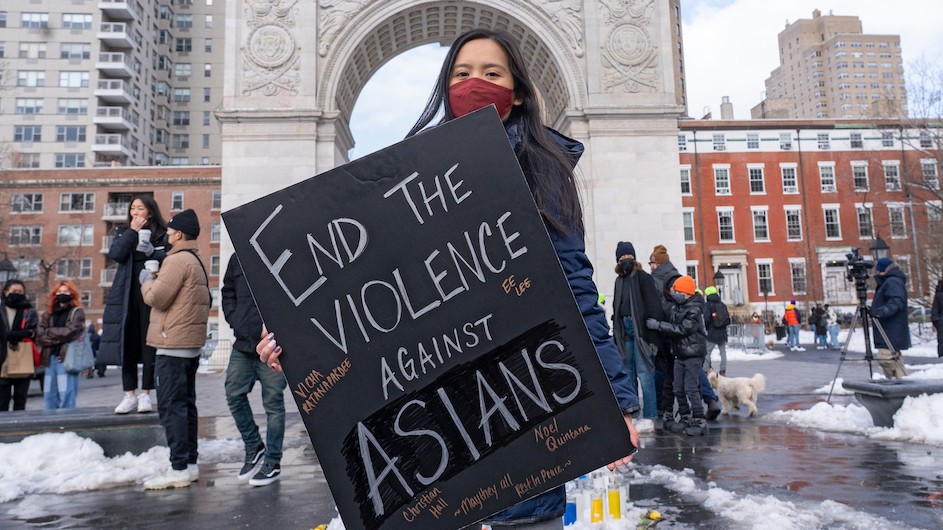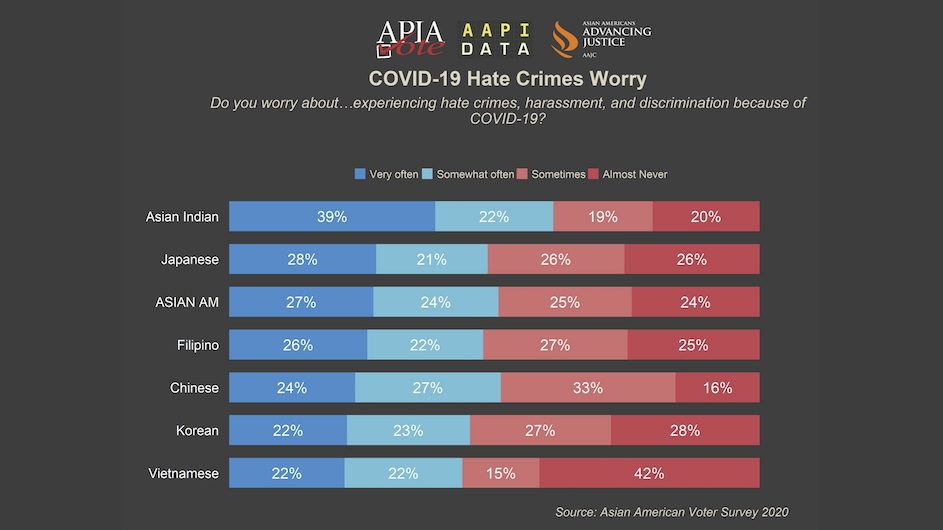'Resist Reducing Them to Statistics:' Anti-Asian Violence in the Face of COVID-19
Recent violence against Asian Americans and Pacific Islanders sadly has deep roots in the history of the United States.

On March 16, a 21 year-old white man shot and murdered eight people in three Asian-owned spas in Atlanta. Six of the eight killed were Asian women. The horrors of the latest deadly attack have elicited a rallying cry that something must be done. For Asian Americans—76 percent of whom have expressed worry about anti-Asian hate crimes, harassment, and discrimination in the face of COVID-19 (Figure 1)—this cry is a year overdue.
Reckoning with Asian America
Since March of last year, there have been nearly 3,800 self-reported incidents of anti-Asian violence from 47 states and the District of Columbia. The most vulnerable have been the most convenient targets: Asian women (who have reported two-thirds of anti-Asian incidents); seniors; and low-wage, economically vulnerable employees who have had to work during the pandemic, such as the victims in Atlanta.

For many observers, Tuesday’s attack was a consequence of the former Trump administration’s anti-Asian rhetoric, as Trump dubbed COVID-19 the “kung flu” and blamed its spread on China. The very evening of the recent murders in Atlanta, Trump used the slur “China virus” on air. Indeed, research has demonstrated that Americans exposed to such rhetoric are more likely to perceive Asian Americans as foreign and un-American.
Yet anti-Asian racism, misogyny, and violence have a much longer, brutal, and ugly history in the United States. One of the largest mass lynchings in U.S. history took place in Los Angeles in 1871, when 18 Chinese residents—10 percent of the Chinese population in L.A. at the time—were killed by a white mob. In 1875, the Page Act was introduced to “end the danger of cheap Chinese labor and immoral Chinese women,” becoming the first federal exclusionary law in the United States. By stereotyping Chinese women as prostitutes, this early law institutionalized the sexualization and objectification of Asian women.
Reactions From Across Columbia
Male Chinese laborers who helped build the transcontinental railroad were perceived by white settlers as economic threats, clannish, filthy, and unassimilable, and were subsequently banned from immigrating through the Chinese Exclusion Act of 1882. In the years that followed, thousands of Chinese immigrants were harassed, assaulted, and expelled throughout communities in California and the Pacific Northwest. During the Rock Springs Massacre of 1885, for example, white miners killed 28 Chinese workers, wounded 15, and forced out hundreds before setting ablaze their living quarters.
Asian Americans are largely invisible in the nation’s textbooks and university curricula. Yet the effects of this early Asian American history continue to shape the perceptions and experiences of Asian Americans today. Asian American women report being stereotyped as passive and demure, and experiencing racialized sexual harassment. Women working in small businesses may be particularly vulnerable to law enforcement and immigration raids, all while lacking fair labor and union protections. And in Tuesday’s mass shooting, the shooter, claiming a sex addiction, chose Asian-owned spas, and targeted Asian women in particular, as the objects of his rage.
While an eyewitness heard the shooter yell he wanted to “kill all Asians,” this critical detail is absent from mainstream American media, despite having been reported by the Korean language newspaper Choson Illbo.
As we mourn for the victims, resist reducing them to statistics of anti-Asian violence: say their names, humanize them, render them visible, and recognize that the present moment of anti-Asian violence is a reflection of our brutal and violent past.
Daoyou Feng
Suncha Kim
Paul Andre Michels
Hyung Jung Park
Julie Park
Xiaojie Tan
Delaina Ashley Yaun
Yong A. Yue

Jennifer Lee is the Julian Clarence Levi Professor of Social Sciences in the department of sociology at Columbia University, past president of the Eastern Sociological Society, and senior researcher at AAPI Data.
Tiffany Huang, a PhD candidate in the department of sociology at Columbia University, contributed to the article.
This column is editorially independent of Columbia News.